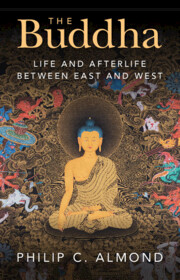Book contents
- Praise for The Buddha
- The Buddha
- The Buddha
- Copyright page
- Dedication
- Epigraph
- Contents
- Plates
- Acknowledgements
- Prologue
- 1 Stories of the Buddha
- 2 The Quest for Enlightenment
- 3 The Buddha, the Greeks, and the Naked Philosophers
- 4 Mongols, Missionaries, and the Chief of the Idols
- 5 Saint Josaphat, the Buddha of Christendom
- 6 Imagining the Buddha
- 7 The Quest for the Historical Buddha
- 8 A Buddha for the West
- Epilogue
- Bibliography
- Index
- Plate Section (PDF Only)
7 - The Quest for the Historical Buddha
Published online by Cambridge University Press: 09 November 2023
- Praise for The Buddha
- The Buddha
- The Buddha
- Copyright page
- Dedication
- Epigraph
- Contents
- Plates
- Acknowledgements
- Prologue
- 1 Stories of the Buddha
- 2 The Quest for Enlightenment
- 3 The Buddha, the Greeks, and the Naked Philosophers
- 4 Mongols, Missionaries, and the Chief of the Idols
- 5 Saint Josaphat, the Buddha of Christendom
- 6 Imagining the Buddha
- 7 The Quest for the Historical Buddha
- 8 A Buddha for the West
- Epilogue
- Bibliography
- Index
- Plate Section (PDF Only)
Summary
Chapter 7 explores the Copernican revolution in the Western study of Buddhism in the first fifty years of the nineteenth century. It argues that it occurred in two moments, the first of which was necessary for the second to occur. The first was the creation of the term ‘Buddhism’ at the beginning of the nineteenth century. Over the next fifty years, this term and a variety of linguistic variants in European languages appeared in the West and became the norm. The second and crucial moment was the creation of Buddhism as an object defined predominantly in terms of its own textuality. Thus, from 1820 to 1860, Buddhism came to exist in the ‘Oriental’ libraries, institutes, learned societies, and universities of the West. It was discovered in its texts and manuscripts on the desks of the European scholars who laboriously learned the languages, read the texts, and translated, interpreted, and published them. The chapter shows how, in the early 1820s, the Buddha left the world of myth and began to become a figure in history.
Keywords
- Type
- Chapter
- Information
- The BuddhaLife and Afterlife Between East and West, pp. 247 - 282Publisher: Cambridge University PressPrint publication year: 2023

